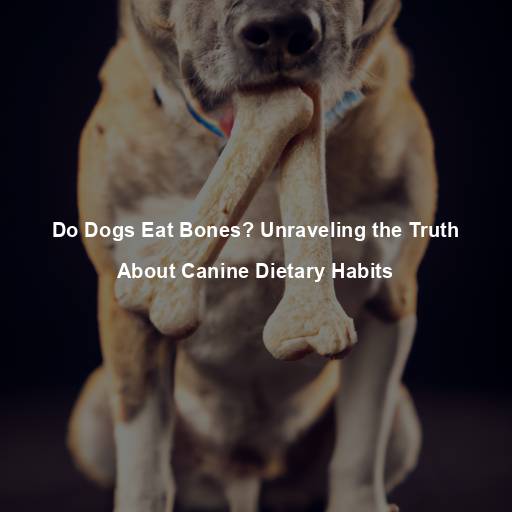What Can’t Dogs Eat: A Comprehensive Guide to Keeping Your Furry Friend Safe and Healthy
Last Updated on October 29, 2023 by Evan
Contents
- 1 Understanding Your Dog’s Dietary Needs
- 2 The Danger of Toxic Foods
- 3 Everyday Foods That Can Be Harmful
- 4 The Importance of Consulting Your Veterinarian
- 5 Kitchen Staples That Should Stay Out of Reach
- 6 Plants and Household Items to Avoid
- 7 FAQs – What can’t dogs eat?
- 7.1 What foods are toxic to dogs?
- 7.2 Can dogs eat chocolate?
- 7.3 Are grapes and raisins safe for dogs?
- 7.4 Can dogs eat onions and garlic?
- 7.5 Is alcohol dangerous for dogs?
- 7.6 Can dogs eat avocados?
- 7.7 Are macadamia nuts safe for dogs?
- 7.8 What products contain xylitol and why is it dangerous for dogs?
Understanding Your Dog’s Dietary Needs
Our bond with dogs goes beyond the conventional notion of pet ownership. They have become beloved members of our families, deserving of the utmost love, care, and nourishment. When it comes to their well-being, their diet plays a pivotal role. However, understanding what to feed our canine companions is just half the battle; avoiding harmful foods is equally crucial.
The Danger of Toxic Foods
Chocolate: A Sweet Treat That Can Be Deadly
For us humans, chocolate is a delightful guilty pleasure that tempts our taste buds. But, alas, for our beloved furry friends, it’s a different story. Little do we know, theobromine, a sneaky compound hiding in the depths of chocolate, can unleash havoc on our canine companions. From stomach-turning vomiting and uncontrollable diarrhea to racing heartbeats and terrifying seizures, the consequences are perplexing and downright alarming.
Xylitol: The Sweetener That Spells Trouble
Xylitol, an artificial sweetener used in many sugar-free products, poses a significant threat to our canine companions. Found in items like gum, candy, baked goods, and even toothpaste, xylitol can cause a sudden release of insulin in dogs, leading to a dangerous drop in blood sugar levels. Symptoms of xylitol poisoning include weakness, vomiting, seizures, and, in severe cases, liver failure. Always check the labels of products before sharing any treats with your furry friend.
Grapes and Raisins: A Hidden Hazard
Did you know that grapes and raisins, innocent as they may appear, can be surprisingly dangerous for our beloved furry friends? It seems that, in certain cases, these seemingly harmless fruits can actually lead to kidney failure in dogs, even when consumed in small quantities. Curiously, scientists have yet to identify the specific culprit behind this perplexing toxicity, and the severity of the reaction can differ greatly from one dog to another. To ensure the well-being of our four-legged companions, it is strongly advised to keep grapes and raisins safely out of their curious paws.
Onions and Garlic: No Seasoning for Dogs
Onions and garlic, common ingredients found in many dishes, can be toxic to dogs when consumed in large quantities. These vegetables contain compounds that can damage red blood cells, leading to anemia. Symptoms of onion and garlic toxicity include weakness, vomiting, and breathlessness. Be mindful of not sharing any meals seasoned with these ingredients with your furry friend.
Everyday Foods That Can Be Harmful
Fatty Foods: Proceed with Caution
It’s no secret that our beloved pups have a taste for the finer things in life, but when it comes to fatty foods, caution is key. You see, even though a little bit of fat is necessary for their well-being, going overboard can lead them down a slippery slope known as pancreatitis. This condition, marked by an inflamed pancreas, can unleash a world of pain for your furry friend, with symptoms like tummy troubles, vomiting, and a serious case of the runs. So, while it may be tempting to share your greasy guilty pleasures with your four-legged companion, it’s best to think twice and explore healthier options that will keep their tail wagging and their tummy happy.
Dairy Products: Not All Dogs Are Lactose-Tolerant
Despite what many people think, it’s important to note that not every dog out there can handle dairy products with ease. It turns out that a fair number of our four-legged friends are actually lactose intolerant, which means they lack the necessary enzymes to properly break down lactose, the sugar found in milk and other dairy goodies. If you do happen to slip some dairy into your pup’s diet, brace yourself for potential tummy troubles such as upset stomachs and unwanted visits to the backyard. To satisfy your pooch’s dairy cravings without the digestive chaos, consider checking out the wide array of lactose-free alternatives specially made for dogs.
Raw Meat and Eggs: A Recipe for Disaster
When it comes to feeding your beloved furry companion, it’s essential to be aware of potential dangers lurking in raw meat and eggs. We’re talking about the menacing presence of bacteria such as Salmonella and E. coli, ready to wreak havoc on your pet’s delicate system. Imagine the perplexity that arises when your furry friend experiences bouts of tummy troubles, including unrelenting vomiting and diarrhea. That’s not all – opting for a raw food diet may also bring about nutritional imbalances, leaving you with even more questions than answers.
Caffeine: A No-Go for Dogs
We all know how tempting it is to share our guilty pleasures with our furry friends, but when it comes to caffeine, dogs should steer clear. From that comforting cup of coffee in the morning to those energy drinks that give us a much-needed boost, caffeine may give us humans a jolt, but for our canine companions, it can cause quite the commotion. Restlessness, rapid breathing, heart palpitations, and even seizures can be the surprising consequences of letting your pup get a taste of this stimulating brew. So, next time you reach for that cup of joe, remember to keep it out of your four-legged friend’s reach to prevent any perplexing health issues.
The Importance of Consulting Your Veterinarian
In the vast realm of canine nutrition, this guide offers a thoughtful compilation of foods to tread with caution. However, it is vital to embrace the mesmerizing individuality that each dog possesses. From breed to age, weight to overall well-being, their intricate composition shapes the reactions they exhibit towards various tantalizing treats. In navigating this bewildering culinary maze, it is indispensable to consult your trusted veterinary expert, weaving their golden threads of wisdom into the fabric of your furry companion’s dietary journey.
Alcohol: A Hazardous Beverage
As pet owners, we often overlook the dangers that alcohol poses to our furry companions. While it may seem harmless to indulge in a cocktail or two during social gatherings, dogs are especially vulnerable to the effects of alcohol. Even a tiny quantity can trigger a range of distressing symptoms, including disorientation, uncontrollable vomiting, and slowed breathing. This imbibing mishap could escalate to the grave, potentially inviting early departure or inducing a state of coma.
Avocado: A Forbidden Fruit
While avocados are a healthy snack for humans, they contain a toxin called persin that can be toxic to dogs. Persin is present in various parts of the avocado, including the fruit, pit, leaves, and bark. Ingesting large amounts of avocado can cause stomach upset, vomiting, and pancreatitis in dogs. It’s best to avoid sharing your avocado treats with your furry friend.
Macadamia Nuts: A Nutritional No-Go
Did you know that those tiny macadamia nuts can actually be quite dangerous for our loyal dog companions? It turns out that these seemingly innocent nuts contain a mysterious toxin that can wreak havoc on our furry friends. If a dog happens to ingest macadamia nuts, it can experience a range of distressing symptoms such as weakness, tremors, vomiting, and even a spike in body temperature. To ensure the well-being of our four-legged pals, it is crucial to keep all macadamia nut products out of their reach, including cookies and candies.
Raw Dough: A Recipe for Disaster
Raw dough made with yeast poses a significant danger to dogs. When ingested, the yeast continues to ferment in the warm environment of your dog’s stomach, producing alcohol and carbon dioxide. This can lead to a bloated and distended stomach, causing extreme discomfort and potentially leading to a life-threatening condition known as gastric dilatation-volvulus (GDV). Always keep raw dough out of your dog’s reach and never give them dough as a treat.
Kitchen Staples That Should Stay Out of Reach
Salt: A Spice to Use Sparingly
As a responsible dog owner, it’s crucial to be aware of the potential dangers of excessive salt consumption for our furry friends. While small amounts of salt are typically harmless, it’s vital to keep a watchful eye on our pups’ sodium intake to prevent any potential health complications. Symptoms of salt poisoning, such as increased thirst, vomiting, diarrhea, tremors, or even seizures, should never be taken lightly. So, let’s remember to resist the temptation of sharing our favorite salty snacks with our canine companions and prioritize their well-being above all else.
Sugar-Free Products: Beware of Artificial Sweeteners
As mentioned earlier, xylitol is a dangerous sweetener for dogs, but it’s not the only one to be cautious of. Other artificial sweeteners, such as aspartame and saccharin, can also be harmful. Sugar-free products, including candies, gum, and baked goods, may contain these sweeteners. Always read labels carefully and avoid sharing any sugar-free treats with your furry friend.
Bones: Not Always a Safe Chew
While chewing on bones can be a natural instinct for dogs, not all bones are safe for consumption. Cooked bones, especially those from poultry or fish, can splinter easily and pose a choking hazard or cause internal injuries. It’s best to provide your dog with specially designed chew toys or treats that are safe for them to enjoy.
Plants and Household Items to Avoid
Certain Houseplants: Greenery Can Be Risky
As we fill our abodes with lush foliage, it’s vital to tread with caution when it comes to our furry friends. Unfortunately, Mother Nature’s creations aren’t always friendly to our canine companions. Beware of the seemingly innocent houseplants like lilies, azaleas, tulips, and daffodils – they may harbor hidden hazards that can leave your pooch in a state of perplexity. Keep a watchful eye and ensure that your four-legged partner steers clear of these botanical villains, or better yet, embrace pet-friendly alternatives for a burst of natural beauty without the worry.
Cleaning Products: Chemicals to Keep Away
Many household cleaning products contain chemicals that can be harmful to dogs. Bleach, ammonia, and certain detergents can cause irritation to the skin, eyes, and respiratory system. Always store cleaning products in a secure location, away from your furry friend’s reach, and ensure proper ventilation when using these products.
Medications: Keep Them Secure
Human medications, even those that are safe for us, can be dangerous for dogs. Painkillers, antidepressants, and common over-the-counter drugs can have adverse effects on our furry friends. Keep all medications securely stored in cabinets or drawers that are inaccessible to your dog. If your dog requires medication, consult with your veterinarian to ensure the proper dosage and medication specifically formulated for dogs.
FAQs – What can’t dogs eat?
What foods are toxic to dogs?
As dog owners, it’s our responsibility to be aware of the foods that can pose a serious threat to our four-legged companions. The list of potential dangers may surprise you: chocolate, caffeine, grapes, raisins, onions, garlic, alcohol, avocado, macadamia nuts, and products sweetened with xylitol. While it may be perplexing to understand why these seemingly harmless foods can cause such harm, it’s crucial to keep them far away from Fido’s curious snout. By doing so, we can ensure that our beloved canine companions stay healthy and happy, free from the burst of dangerous side effects.
Can dogs eat chocolate?
No, dogs cannot eat chocolate. Chocolate contains theobromine and caffeine, both of which are toxic to dogs. Ingesting chocolate can lead to symptoms such as vomiting, diarrhea, increased heart rate, restlessness, tremors, and in severe cases, seizures. The darker the chocolate, the higher the level of these harmful substances, making dark chocolate more dangerous than milk chocolate. It is crucial to keep all chocolate products away from dogs.
Are grapes and raisins safe for dogs?
You know those juicy grapes and raisins that make your taste buds dance? Well, they’re a big no-no for your furry friends. Can you believe that even a minuscule bite can send your pooch on an unplanned trip to Kidney Failure Town? Cue symptoms like tummy troubles, fatigue, loss of appetite, and an unquenchable thirst. So do your pup a solid and keep those grape goodies far, far away from their wagging tails.
Can dogs eat onions and garlic?
It’s a common misconception that onions and garlic are harmless for dogs. Let’s set the record straight – these seemingly innocent vegetables can actually wreak havoc on your furry friend’s health. Packed with compounds that can wreak havoc on a dog’s red blood cells, onions and garlic have been known to cause anemia. From weakness and pale gums to an elevated heart rate and even organ damage, the symptoms can be alarming. Whether raw or cooked, it’s vital to keep any meals seasoned with these ingredients far away from your four-legged companion.
Is alcohol dangerous for dogs?
Yes, alcohol is extremely dangerous for dogs. Even small amounts can be toxic and potentially fatal. Dogs are much more sensitive to alcohol than humans, and it can lead to symptoms like vomiting, diarrhea, difficulty breathing, abnormal blood acidity, depression, tremors, and in severe cases, coma or death. It is crucial to prevent your dog from accessing any alcoholic beverages or foods that contain alcohol.
Can dogs eat avocados?
It is best to avoid feeding avocados to dogs. While the flesh of ripe avocados is not inherently toxic to dogs, they contain a substance called persin, which is toxic to some animals, including dogs. Consuming excessive amounts of persin can cause symptoms like vomiting, diarrhea, abdominal pain, and breathing difficulties. The high-fat content of avocados can also lead to digestive issues and pancreatitis in dogs. It is safer to keep avocados away from your canine companions.
Are macadamia nuts safe for dogs?
No, macadamia nuts are not safe for dogs. Ingesting macadamia nuts can cause various symptoms, including weakness, lethargy, vomiting, tremors, increased body temperature, and difficulty walking. These nuts contain certain toxins that can affect a dog’s nervous system and muscles. It is important to be cautious and ensure that your dog does not consume any foods containing macadamia nuts.
What products contain xylitol and why is it dangerous for dogs?
Xylitol is a naturally occurring sugar substitute that is safe for humans but highly toxic to dogs. It can be found in various products such as sugar-free gum, candies, baked goods, oral hygiene products (toothpaste, mouthwash), dietary supplements, and some peanut butter brands. Ingesting xylitol can cause a rapid release of insulin in dogs, leading to a dangerous drop in blood sugar levels. Symptoms may include vomiting, loss of coordination, lethargy, seizures, and liver failure. Xylitol can be life-threatening to dogs, so it is essential to prevent their access to any products containing this sweetener.





